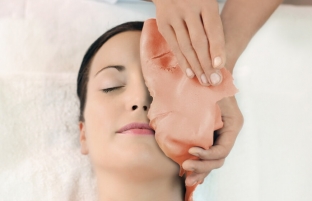Currently, organic products are very popular and in demand in cosmetology. Nature around us has created many amazing things, and many thousands of years ago people began to use the "gifts of nature" in different areas of your life. It has long been known about the beneficial properties of algae: spirulina, kelp, fucus and many others. Their healing properties are explained mainly by the content of alginic acid – a polysaccharide built from uronic acid residues. In cosmetology, alginates are used in the form of masks that are used to care for the skin of the face and body.
Features of the use of alginates in modern cosmetology
Alginate – it is a natural component enriched with active substances from brown and red algae. According to its composition, alginate is a delicate fine powder, which, when mixed with water, forms a gel, and is applied in thick layers to the skin.
Alginate masks create a “second skin” effect, thanks to which their active substances are well absorbed.
Alginates in the composition of the masks stimulate blood circulation, nourish and moisturize the skin, improving its structure, reduce enlarged pores, remove the keratinized layer of cells, and also significantly enhance the effect of cosmetics applied under the mask. The positive effect of alginate masks on the skin condition makes them a very popular cosmetic procedure.
Alginate:
- alginate as the main component of alginate masks;
- method of applying the mask with alginate to the skin;
- The main positive effects of the use of alginate.
Alginate as the main component of alginate masks
Alginate – it is a block polymer of D-mannuronic and L-guluronic acids. The main properties of alginate – this is its viscosity, as well as the ability to swell and gel. The main sources of alginic acid and its salts are lanimaria and fucus, although this substance is also found in many other algae. Protection of skin cells – this is the main biological role of alginates. Masks containing alginate are strong sorbents that can absorb moisture from the skin surface. Together with harmful substances, water is removed from the surface of the skin. The beneficial properties of alginate make it a highly effective organic ingredient in many cosmetics.
Method of applying the mask with alginate to the skin
Applying an alginate mask – This is a special art that not every cosmetologist can master. The process is as follows:
- dry mass containing alginate is mixed with water to the consistency of thick sour cream;
- mass with a spatula is applied to the patient's previously cleansed skin, while the mask is also applied to the eyelids and lips, which provides a good lymphatic drainage effect and venous outflow;
- The mask is applied in a thick layer of 3-5 mm, as if applied too thin, the mask may dry out during exposure and be difficult to remove;
- after 15-30 minutes, the mask is removed using a special "stocking"; or "rubber cast", in one motion, starting from the bottom edge.

The main positive effects of the use of alginate
The positive effects of applying alginate masks are numerous. Due to the binding of class E immunoglobulins, alginate has an immunocorrective effect. Its ability to retain moisture helps to normalize the water balance of the skin, which is especially good for patients with dry, dehydrated skin. Thanks to active mineralization, the alginate mask improves the color and appearance of the skin, tightens it, smoothes wrinkles and tightens pores, improves tone and elasticity, and contributes to the correction of facial contours.
The effect of using alginate masks can be seen already after the first procedure: the skin looks very fresh and toned.
A noticeable anti-aging effect makes alginate masks popular among older patients. The maximum effect from the use of alginate can be achieved after the course application of alginate masks.







Add a comment